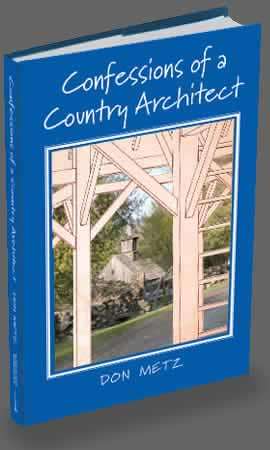Don Metz's new book
"Confessions of a Country Architect"
is now available

Don Metz's Confessions describes the life of a residential country architect with wry humor and pathos. This book will delight all those who have built a house, forearm those summoning up the courage to do so, and calm those who realize their talents might be better confined to an armchair with a view. Readers will be seduced by the author's adventures as he confronts the awkward, intractable, and hilariously messy job of building dreams.
Order from the publisher or Amazon now.
Excerpt from Confessions of a Country Architect
Horton
According to his directions, Horton’s sawmill “set in the bushes” across from his house. “Can’t miss it,” he said.
I missed it. When I knew I had driven too far, I stopped and asked directions from an old farmer digging up potatoes in his garden. It was a brutally hot day, and he was grateful for an excuse to stop working. Pointing back in the direction I’d just come from, he carefully described the turns and landmarks I should ignore. “That second side road won’t take you nowhere you’d ever want to go,” and, “Used to be a big barn on the side of the road, but it burned down when I was twelve – no, come to think of it, I guess I was thirteen years old.” He instructed me to go back exactly the way I’d come, and, “Look for a red mailbox welded to a goddamned posthole auger. Can’t miss it,” he said.
In the mill yard, I parked between leaning towers of lumber and walked through a maze of logs until I found Horton. He was fiddling with something on the big noisy engine that powered the saw. When he noticed me, he shut it off, and instantly the day seemed to shrink down to the smells of diesel fuel and sun-baked sawdust. He wiped his hands on a greasy rag as I approached, and we nodded greetings. A black and white dog sitting by his side watched me without stirring. By way of an introduction, I said I had called about buying pine boards.
“Horton Bowles,” he said, extending a hand the size of a catcher’s mitt. “And the boss,” he added, touching the dog’s head, “Mr. Jiggs.”
At least twice my age, Horton Bowles was tall and angular with a commanding nose and a crusty Yankee accent worthy of the Smithsonian. A master of rural New Hampshire etiquette, his speech was designed to never quite inquire, never quite inform -- and always understate.
“Not exactly cool over your way, is it?” It had been over ninety-five for a week.
As a nouveau native, I was a conversational green horn. “Definitely,” I replied, and instantly regretted my literal response.
“I should judge she’ll cool off substantial tomorrow.”
I chose an agreeable, silent nod rather than risk further shame.
And so it went as we (he) discussed the weather, the condition of the roads, unusual wildlife recently sighted, the lengths and widths of the lumber I wanted, the dog’s latest encounter with a porcupine, and the Red Sox -- in no particular order.
Horton brightened when I asked about the sawmill. He had cobbled it together over a period of years while he worked elsewhere as an electrician, carpenter, welder, and truck mechanic. The log carriage, he explained, was made from a mobile home chassis. The diesel engine was scavenged from a ready-mix truck, the overhead lights rescued from a demolished hospital wing in Plymouth. There was not a single piece that he hadn’t rehabilitated, converted, adapted, assembled and refined himself. The entire sawmill, he said, cost him less than a thousand dollars out-of-pocket. “Plus a few hours labor.”
He was in no hurry to sell me lumber, as if to pursue commerce would have been rude. Over an hour of pleasant banter had passed when I reluctantly mentioned the purpose of my visit.
“This fella’s got to have some lumber,” he sighed to Mr. Jiggs, as if he and the dog were alone. “Guess we got to stop yakking, and amount to something.”
When we had loaded the truck, he used a stubby pencil to tally the footage on the clean side of a white pine, 1x12 board. I watched him round down the figures in my favor, altogether ignoring three or four pieces he’d decided were not up to standard.
“They look okay to me,” I said.
“Can’t charge a man for shoddy work,” he said. “It don’t set right with me.”
I gratefully paid him, and climbed into my overloaded truck. As I was leaving, he asked, “And what sort of work do you do for a living?”
I looked past him at the sawmill he had built for a thousand bucks, at the immense concentration of creative energy, ingenuity, thrift and diligence it represented -- and I knew I’d been greatly privileged to meet someone so thoroughly competent as Horton Bowles. “I’m . . . I’m just getting started.” I was 30 years old and not yet licensed. “I’m . . . an architect.”
Horton nodded politely and squinted up into the unrepentant sun. There was sawdust stuck to the stubble on his chin, and a hint of pity in his voice when he replied, “I should think that would be awfully boring.”

